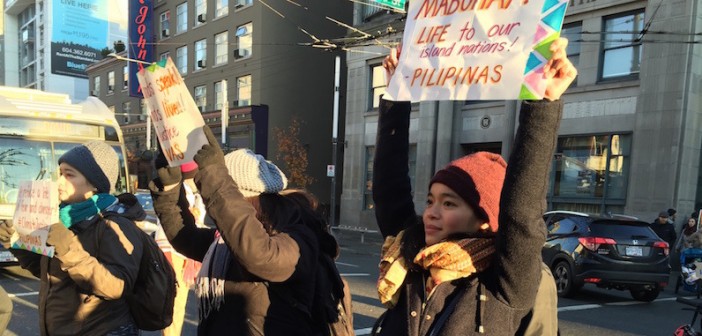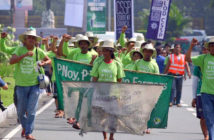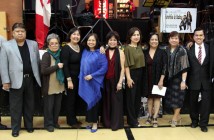Two Filipina migrant scholars in Canada join the climate march in Vancouver. How can Filipinos do transnational work together for climate justice?
By Chaya Ocampo Go and Steffi Tad-y
VANCOUVER, Canada – Drums were beating as we walked over to join a growing crowd gathering at the Vancouver Art Gallery.
As heads of state from over 80 countries were arriving in Paris to negotiate for a historic climate agreement at COP21, the city was staging its own Global Climate March in sync with marches from 174 other countries demanding action for climate justice.
The sun shone fiercely bright, and it was all clear blue above us. We warmed our cheeks while fingers and toes froze through the winter chill. We were going to be 6,000 strong today. Our icy hands held tight to handwritten placards proclaiming: “MABUHAY! LIFE to our island nations, Pilipinas!”
Manila mounted its own climate march with over 10,000 people a time zone earlier. Our small group of overseas Pinays, with our family and friends, prepared to walk from downtown Vancouver, too. The massive crowd of festive banners and placards moved down the street to begin the parade.
Standing on tiptoes, stretching our necks to see through the sea of marchers, we spotted Audrey Siegl at the front, an aboriginal woman leader from the Musqueam Nation, beating her drum held high for us. She beamed as she sang the Women’s Warrior Song.
Siegl’s land, the traditional territory of the Coast Salish people which they never surrendered to the British Crown, is where we are standing: migrant scholars, migrant workers, mga bisita (visitors).
When our hosts lead the way to defend their land from unwanted oil pipeline expansions, tailings dam spills, poisoned air and water, we their guests walk along because Super Typhoon Yolanda (Haiyan), resource extraction, and militarization in our ancestral domains are our very same stories of loss, damage and survival.
Climate justice
Climate justice activism in the context of developed nations needs to be led by indigenous and migrant communities who are at the frontlines of the climate chaos. As we marched, sweeping calls for “clean & green” surrounded us, as much as a real panic for the melting ice caps and a distant doomsday.
But as we walked, remembering the horrors of the strongest storm in recorded history and the already intensifying storms born in the Pacific Ocean just east of our archipelago – all of which are unleashed on our communities steeped in the slow violence of everyday poverty – we know that climate change does not affect the world in equal ways.
As of this writing, President Aquino and his delegation are inside conference rooms in Paris, negotiating with global leaders about the amount of emissions to be reduced to limit the rise of global temperature.
Our head of state serves as the chief of the Climate Vulnerable Forum (CVF), a bloc of 20 countries most vulnerable to climate change.
Alongside the Alliance of Small Island States (AOSIS), of which the Philippines is also a member, CVF is fighting hard to negotiate for a 1.5°C target instead, arguing that a 2°C rise is too late for hundreds of millions of people in the Global South.
We have already lost thousands of our people to Super Typhoon Yolanda, our damaged ecosystems and communities still laboring hard to rebuild themselves before stronger storms roar through.
People Surge, an alliance of disaster survivors in the Philippines, had written an open letter to the Canadian Prime Minister Trudeau demanding for climate justice: “Our survival is non-negotiable!”
We are overseas Pinays in a country of dollars and material abundance that does not understand our island-homes amidst their shimmering skyscrapers and First World comforts. They do not understand why we are here: our live-in caregivers, nurses, petitioned family members, migrant scholars, refugees.
We hold our placards up as high as our arms could lift our voices, drowning in the crowd:
Let our islands speak! Let our islands live! We refuse to live a life of fear and danger!
Our survival
As our former chief negotiator, Yeb Saño, said in COP19 two years ago: “My country refuses to accept a future where super typhoons become a way of life!” And to walk out in the streets of one of the world’s biggest polluters was a way to proclaim that we are not gone and that we are here to stay.
We marched and danced to the tunes of a most brilliant carnival band playing close by. Trumpets, drums and a saxophone! A fiesta!
We know how to celebrate, and this is what this protest was about: Hear our islands, we live! We live! We have buried our dead, but more importantly stand by our living in the eye of a growing storm.
Looking all around us, however, we wondered where in the immense parade we should stand to make our survival more known. Maybe not amidst animal mascots, green banners, and definitions of what “real environmentalists” are.
Our small group decided to wiggle our way out of the massive crowd of thousands upon thousands, and ran out to the sidewalks. Like on a narrow strip of freeway, we dashed up all the way to the front of the march where a different music was playing. Again, to the sound of beating drums.
The First Nations on the frontlines know what surviving through centuries of colonial violence is like. And it is maybe here, with them, where migrant scholars like us could find place to learn what it means to truly walk with our home front. – Rappler.com
Chaya Ocampo Go and Steffi Tad-y are members of the University of British Columbia’s Philippine Studies Series.
Chaya is a graduate student at UBC’s Institute for Gender, Race, Sexuality, and Social Justice. She served as an emergency relief worker in the aftermath of Yolanda.
Steffi Tad-y is an aspiring writer and a furious reader. She lifts up her hand in gratitude to Squamish, Tseil-Watuth, and Musqueam nations, on whose lands she is able to live, love, and do her work. She hopes to graduate from UBC’s English Literature Program in May 2016.




